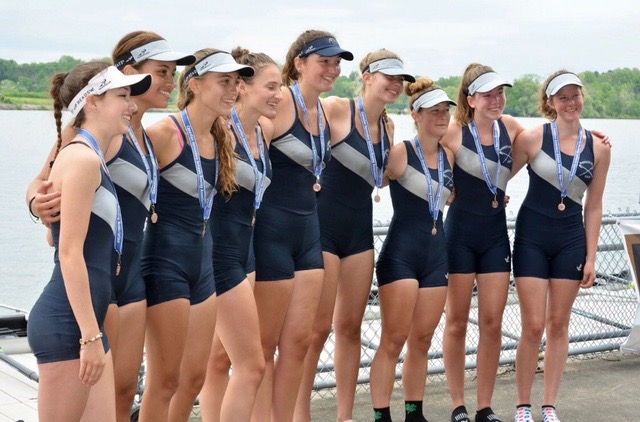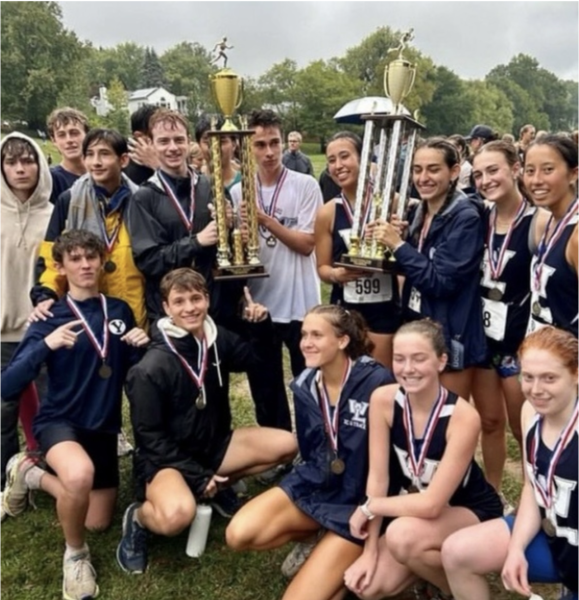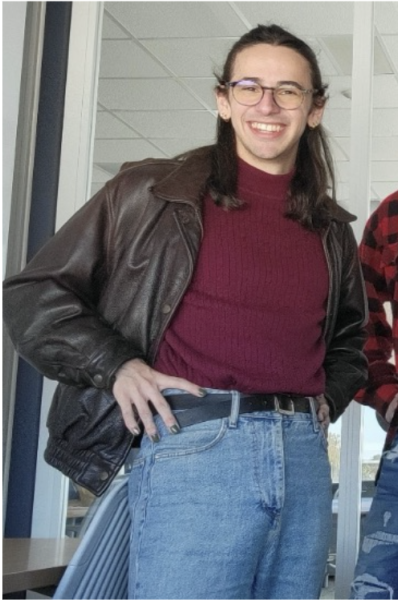Applying to College Programs: How Can They Differ?
Paige Wheeler stands with the Junior 8 Varsity Boat at Canada Secondary Schools Rowing Association (CSSRA) championship. The Junior 8 won 3rd place.
As students approach junior and senior year, the intensifying pressure of college and their future begins to get to closer and closer. Juniors begin to take the Scholastic Assessment Test (SATs) or American College Testing (ACTs) assessments, and seniors begin their applications to colleges. Some students know exactly where they want to go, and some have no idea at all. Some know exactly what they want to do, and some do not. For some majors, however, students may need to know what they want to do before they even get to senior year because he process for applying to different kinds of majors and programs varies.
Senior Ian Page has already applied for early action and been accepted into Boston University as a Science Technology Engineering and Mathematics (STEM) major for mechanical engineering. In regards to STEM, the application can differ depending on the school, but most often they are through the Common Application.
“On that platform they’ll ask for all of your information: personal, academic, community service, extracurricular major, and on top of that a very important essay of about 600 words.” Page said. “I started in the summer as soon as possible and I had all of my [applications] done before the EA date so every [application] was either early action (EA) or early decision (ED). ED is binding versus EA being non binding, that’s very important to know.”
Binding means a student who is accepted as an ED applicant must attend the college, nonbinding means students receive an early response to their application but do not have to commit to the college until a certain date.
“I see STEM as a gateway for people that enjoy creating and researching on a whole new level. Mechanical engineering, which is what I’m going to major in, is a perfect example. It’s such a broad field that really captures an entire basis for engineering,” Page said. “ If you want to be innovative and possibly change the world, go into STEM. If you want to discover a cure for cancer or make housing so that people can live on Mars in 30-50 years, then go into STEM. If you want to be the next Stephen Hawking or Neil deGrasse Tyson, go into STEM.”
Having his eyes set towards mechanical engineering, Page took classes affiliated with his major as much as possible, such as AB Calculus and AP Physics 1, as well as engineering 1, 2 and IB design tech with Ms. Danielle Meyer for all four years of his high school career.
“No matter what ,go for AP, IB and Dual Enrollment classes. They look amazing on your transcripts and they boost your GPA if you do well in them,” Page said.
The process can differ for students who seek a route such as a fine arts program. Applying to a fine arts program is really no different than applying to any other program, it just also requires a few extra steps. Typically, students want to begin the application process as early as one to one and a half years before the proposed entrance date of their freshman semester. The most important aspect of the art program application is the portfolio. This is where students are able to display a variety of media and techniques they use in their art.
Junior Nicole Tucker, an aspiring film major, is looking into highly esteemed film schools such as University of Southern California and Tisch school at New York University, and is planning to tour them this summer.
“I have trained in acting for six years at the Neighborhood Playhouse. This past summer I went to New York Film Academy (NYFA) for a short filmmaking course, but I learned lots,” Tucker said.
While she has yet to put together a portfolio, Tucker has already done a handful of projects, individually and through school.
“[The school] has good resources for film! Like IB Film, the career center media class, and art/film clubs,” Tucker said. “In filmmaker’s society [the club], we choose a film to watch each week for members to think about and discuss. When members have projects going on, we share script ideas, actual scripts, opportunities for each other to work on films and techniques that some of us are fluent in, while others want to learn.”
In regards to the application process, Tucker has already started certain aspects.
“I have been looking at past essay prompts for basic admission. For film school, the applicant must submit a portfolio filled with films and styles that are unique to the filmmaker,” Tucker said. “I have also been writing reflections on my work.”
Athletics is another program in college that may be the most different from fine arts and STEM. Athletic recruitment is the process by which colleges seek out high school athletes for sports teams. Colleges are interested in recruiting athletes who have been working at their sport for a long time, both so they can track students’ progress, but also so that they can see that they are committed to their sport. Coaches are looking for athletes with long-term dedication. Networking and making strong connections are highly important.
Junior Paige Wheeler is a student-athlete who wants to row in college.
“I want to do crew in college because I’ve played a lot of sports and this is the one I love and expect to do for my whole life. The other sports felt like a chore to go to practice and train and with crew I want to get better and want to put in as many hours in a week as possible. The only thing that limits the amount of time I train is my school work. I would definitely prefer to have more time to train,” Wheeler said. “I only have one week out of the year I don’t train 5-6 days a week and that is the week between the fall season and winter training.”
Wheeler has already started the process of recruitment for colleges. She has looked into Syracuse University and University of Texas Austin, and already met with Syracuse University and Bucknell University coaches and toured both schools. She also has used the website BeRecruited for the process, a website in which student athletes showcase their ability by adding stats and videos for college recruiters.
”I started putting myself out there at the end of my sophomore year on BeRecruited. I have used BeRecruited to post my ergometer scores, race videos, and race results, and coaches email me if they are interested and then we keep talking from there. BeRecruited is definitely a really helpful jumping off point.” Wheeler said. “It’s really exciting especially when the coaches reach out first because they want you and you feel really good about being sought after but it’s also really stressful because you have to get better so they will notice you.”
Applying for college can be a stressful time for all students as they think about their future. It’s important for students to start thinking of possible paths they want to take in the future, and how they can start preparing now.
“The most important thing to do out of all of these things is to simply have fun and don’t over stress yourself. Take the classes you want to take. Go for a major you want and if you don’t know, that’s okay!” Page said. “Life is too short to stress out and be depressed, go have fun and enjoy what you do. If your parents want you to be a doctor or an engineer and you want to be a teacher, be a teacher. Follow your dreams.”






